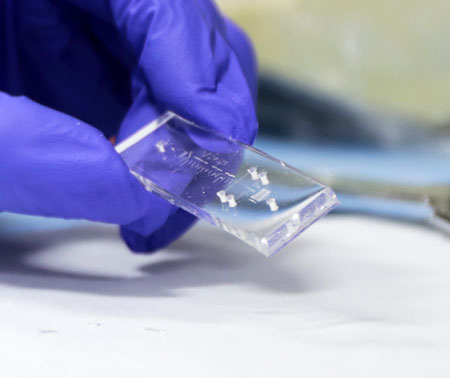Lung Cancer is the leading cause of cancer deaths in the United States. Early diagnosis improves survival rates by 55%, but few people over the age of 50 are screened early. That's why Jian Zhou, PhD and his team invented a new blood test that anyone can take to catch lung cancer early.
Our Research
Lung cancer remains the leading cause of cancer-related mortality worldwide, largely due to late-stage diagnosis and limited tools for early detection. Current methods for lung cancer screening suffer from high false-positive rates, overdiagnosis, and limited sensitivity. Moreover, existing risk stratification models often fail to capture the full spectrum of recurrence risk, particularly in patients with early-stage disease. Compounding these challenges is the lack of robust, predictive preclinical models that accurately mimic the complexity of lung cancer and its tumor microenvironment, hindering the development and testing of novel therapies. These gaps underscore the urgent need for innovative approaches in screening, risk assessment, and translational research to improve outcomes for lung cancer patients.
To address these challenges, the Lung Cancer Research Lab is advancing two major research tracks in close collaboration with healthcare providers:
- Microfluidic Liquid Biopsy for Cancer Early Detection and Monitoring
- Preclinical Models for Precision Oncology
Our lab employs cutting-edge microfluidic technology, advanced imaging methods, molecular biology, and single cell technologies to power the discovery and innovation for improved cancer patient care.
Our Team
Principal Investigator
Lab Members
Bum-Joon Jung, PhD, Postdoc Research Fellow
Shreya Patel, PhD, Postdoc Research Fellow
Christopher C Petter, MD student
Nan Tian, MD student
Lab Alumni
Dr. Zhiyun Yu
Nichole Chang
Lab Openings
Please reach out to Dr. Zhou for lab openings. Our lab welcomes postdoc, MD students, PhD students, undergraduates, and high school students, who are interested in translational cancer research.
Selected publications
- Yu Z, Khan A, Naeem W, J Borgia, Liptay M, Seder C, Zhou J. Microfluidic Lung Cancer Models: Bridging Clinical Treatment Strategies and Tumor Microenvironment Recapitulation. APL Bioengineering, 2025, 9, 041505. Featured Article.
- Naderi MM, Gao H, Zhou J, Papautsky I, Peng Z. Deciphering the unique inertial focusing behavior of sperm cells. Lab Chip. 2025 May 14. doi: 10.1039/d5lc00047e.
- Mukhopadhyay A, Tsukasaki Y, Chan WC, Le JP, Kwok ML, Zhou J, Natarajan V, Mostafazadeh N, Maienschein-Cline M, Papautsky I, Tiruppathi C, Peng Z, Rehman J, Ganesh B, Komarova Y, Malik AB. trans-Endothelial neutrophil migration activates bactericidal function via Piezo1 mechanosensing. Immunity. 2024 Jan 9;57(1):52-67.e10.
- Luan Q, Pulido I, Isagirre A, Carretero J, Zhou J, Shimamura T, Papautsky I. Deciphering fibroblast-induced drug resistance in non-small cell lung carcinoma through patient-derived organoids in agarose microwells. Lab Chip. 2024 Mar 26;24(7):2025-2038.
- Zhou J, Vorobyeva A, Luan Q, Papautsky I. Single Cell Analysis of Inertial Migration by Circulating Tumor Cells and Clusters. Micromachines (Basel). 2023 Mar 31;14(4):787.
- Luan Q, Becker JH, Macaraniag C, Massad MG, Zhou J, Shimamura T, Papautsky I. Non-small cell lung carcinoma spheroid models in agarose microwells for drug response studies. Lab Chip. 2022 Jun 14;22(12):2364-2375.
- Zhou J, Tu C, Liang Y, Huang B, Fang Y, Liang X, Ye X. The label-free separation and culture of tumor cells in a microfluidic biochip. Analyst. 2020 Mar 2;145(5):1706-1715.
- Zhou J, Kulasinghe A, Bogseth A, O'Byrne K, Punyadeera C, Papautsky I. Isolation of circulating tumor cells in non-small-cell-lung-cancer patients using a multi-flow microfluidic channel. Microsyst Nanoeng. 2019 Feb 25;5:8.
Rush University Medical Center
1750 W. Harrison St, Jelke 867
Chicago, IL 60612
Phone: (312) 942-2419
Email: jian_zhou@rush.edu


